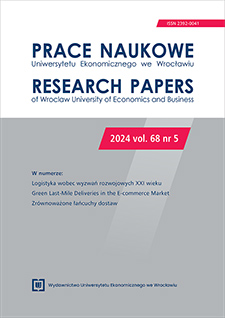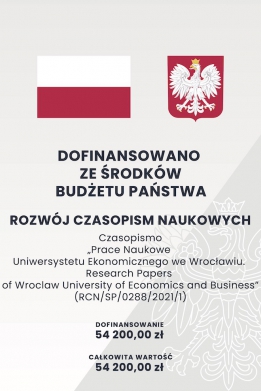The Impact of Macro-environment and Industry Conditions on Shaping the Circularity of Supply Chains
DOI:
https://doi.org/10.15611/pn.2024.5.02Keywords:
circularity, supply chain, macro-environment, industry conditionsAbstract
Aim: The aim of the article is to show the main determinants of the macro-environment and closer (industry) environment from the perspective of shaping circular supply chains. The paper identifies the above-mentioned conditions, and then analyzes and evaluates the results of empirical research for factors of this two perspectives in the context of their impact on the closure of supply chains.
Methodology: In addition to the literature analysis and desk research on the impact of individual factors stimulating or destimulating the construction of circular supply chains, the article presents the results that are part of a broader survey conducted using the CAWI method in 2023 among FMCG companies. The study included 325 companies, which is a representative sample for the surveyed population.
Results: The results of the research provide the basis for the conclusion that external conditions, both macroeconomic and industry-related, have a significant impact on shaping the circularity of supply chains, and closing their circulation requires designing and building relationships that are very often inter-industry and that take into account specific macroeconomic factors.
Implications and recommendations: The results and conclusions of the research can be a recommendation for shaping strategies and building circular supply chains in the FMCG industry. However, in order to obtain a comprehensive picture, it would be necessary to conduct an analysis of internal organizational factors, as well as to conduct analyses in other industries, which implies space for further research on the issue of closing supply chains in the economy.
Originality/value: In the literature, much more attention is paid to identifying internal conditions that can shape the circularity of supply chains. The presented research results indicate the factors of the more macroeconomic and industry-related environment as important areas that can significantly affect the building of circular supply chains and their closure.
Downloads
References
Aminoff, A. i Kettunen, O. (2016). Sustainable Supply Chain Management in a Circular Economy—Towards Supply Circles. Smart Innovation, Systems and Technologies, 52, 61-72. https://doi.org/10.1007/978-3-319-32098-4_6
De Angelis, R., Howard, M. i Miemczyk, J. (2018). Supply Chain Management and the Circular Economy: Towards the Circular Supply Chain. Production Planning & Control, 29(6), 425-437. https://doi.org/10.1080/09537287.2018.1449244
de Freitas Netto, S. V., Sobral, M. F. F. i Ribeiro, A. R. B. (2020). Concepts and Forms of Greenwashing: A Systematic Review. Environmental Sciences Europe 32, 19, 1-12. https://doi.org/10.1186/s12302-020-0300-3
Del Giudice, M., Chierici, R., Mazzucchelli, A., i Fiano, F. (2021). Supply Chain Management in the Era of Circular Economy: The Moderating Effect of Big Data. The International Journal of Logistics Management, 32(2), 337-356. https://doi.org/10.1108/IJLM-03-2020-0119
Dev, N. K., Shankar, R., i Qaiser, F. H. (2020). Industry 4.0 and Circular Economy: Operational Excellence for Sustainable Reverse Supply Chain Performance. Resources, Conservation and Recycling, 153. https://doi.org/10.1016/j.resconrec.2019.104583 European Commission: Directorate-General for Research and Innovation, Renda, A., Schwaag Serger, S., Tataj, D., Morlet, A., Isaksson, D., Martins, F., Mir Roca, M., Hidalgo, C., Huang, A., Dixson-Declève, S., Balland, P., Bria, F., Charveriat, C.,
Dunlop, K. i Giovannini, E. (2021). Industry 5.0, a Transformative Vision for Europe: Governing Systemic Transformations Towards a Sustainable Industry. Publications Office of the European Union. https://data.europa.eu/doi/10.2777/17322
European Commission: Directorate-General for Research and Innovation. (2024). ERA Industrial Technologies Roadmap on Human-centric Research and Innovation for the Manufacturing Sector. Publications Office of the European Union. https://data.europa.eu/doi/10.2777/0266
Falsafi, M. i Fornasiero, R. (2022). Explorative Multiple-case Research on the Scrap-based Steel Slag Value Chain: Opportunities for Circular Economy. Sustainability, 14(4). https://doi.org/10.3390/su14042284
Gierszewska, G. i Romanowska, M. (2017). Analiza strategiczna przedsiębiorstwa. PWE.
Geissdoerfer, M., Vladimirova, D. i Evans, S. (2018). Sustainable Business Model Innovation: A Review. Journal of Cleaner Production, 198, 401-416. https://doi.org/10.1016/j.jclepro.2018.06.240
Kiefer, C. P., González, P. D. R., i Carrillo‐Hermosilla, J. (2019). Drivers and Barriers of Eco‐innovation Types for Sustainable Transitions: A Quantitative Perspective. Business Strategy and the Environment, 28(1), 155-172. https://doi.org/10.1002/bse.2246
Kiełczewski, S. (2000). Zarządzanie strategiczne: praca zbiorowa (III wyd. poprawione i rozszerzone). Wydawnictwo Akademii Ekonomicznej im. Oskara Langego.
Kreye, M. E. i van Donk, D. P. (2021). Servitization for Consumer Products: An Empirical Exploration of Challenges and Benefits for Supply Chain Partners. International Journal of Operations and Production Management, 41(5), 494-516. https://doi.org/10.1108/IJOPM-07-2020-0439
Lähdeaho, O. i Hilmola, O. (2020). Business Models Amid Changes in Regulation and Environment: The Case of Finland-Russia. Sustainability, 12(8). https://doi.org/10.3390/SU12083393
Lewandowski, M. (2016). Designing the Business Models for Circular Economy—Towards the Conceptual Framework. Sustainability, 8(1), 43. https://doi.org/10.3390/su8010043
Marzantowicz, Ł., Ocicka, B. i Pluta-Zaremba, A. (2021). Ekologiczne podejście do tworzenia łańcucha wartości – stan i uwarunkowania. Oficyna Wydawnicza SGH.
Mina, H., Kannan, D., Gholami-Zanjani, S. M. i Biuki, M. (2021). Transition towards Circular Supplier Selection in Petrochemical Industry: A Hybrid Approach to Achieve Sustainable Development Goals. Journal of Cleaner Production, 286. https://doi.org/10.1016/j.jclepro.2020.125273
Moreno-Miranda, C., Pilamala, A., Molina, I., Cerda-Mejía, L., Moreno-Miranda, R. i Rama, D. (2020). An Assessment of Emerging Networks in the Fruit Sector: The Case of Inca Berry in Ecuador. African Journal of Food, Agriculture, Nutrition and Development, 20(1), 15365-15382. https://doi.org/10.18697/ajfand.89.18290
Nowicka, K. (2022). Gospodarka w obiegu zamkniętym. Łańcuchy dostaw. Część 2. Oficyna Wydawnicza SGH.
Oh, J. i Jeong, B. (2014). Profit Analysis and Supply Chain Planning Model for Closed-loop Supply Chain in Fashion Industry. Sustainability, 6(12), 9027-9056. https://doi.org/10.3390/su6129027
Paryskie porozumienie klimatyczne. (2016). Pobrano 17 kwietnia 2023 z https://eur-lex.europa.eu/legal-content/PL/TXT/?uri=celex%3A22016A1019%2801%29
Sani, D., Picone, S., Bianchini, A., Fava, F., Guarnieri, P. i Rossi, J. (2021). An Overview of the Transition to a Circular Economy in Emilia-Romagna Region, Italy Considering Technological, Legal–Regulatory and Financial Points of View: A Case
Study. Sustainability, 13(2), 1-23. https://doi.org/10.3390/su13020596
Tura, N., Hanski, J., Ahola, T., Ståhle, M., Piiparinen, S., i Valkokari, P. (2019). Unlocking Circular Business: A Framework of Barriers and Drivers. Journal of Cleaner Production, 212, 90-98. https://doi.org/10.1016/j.jclepro.2018.11.202
Vermeulen, W. J. V. (2015). Self-governance for Sustainable Global Supply Chains: Can It Deliver the Impacts Needed? Business Strategy and the Environment, 24(2), 73-85. https://doi.org/10.1002/bse.1804
Xin, L., Lang, S., i Mishra, A. R. (2022). Evaluate the Challenges of Sustainable Supply Chain 4.0 Implementation under the Circular Economy Concept Using New Decision Making Approach. Operations Management Research, 15(3-4), 773-792. https://doi.org/10.1007/s12063-021-00243-7
Yoon, S. i Jeong, S. (2017). Investment Strategy in a Closed Loop Supply Chain: The Case of a Market with Competition between Two Retailers. Sustainability, 9(10). https://doi.org/10.3390/su9101712
Zhang, X., Zhao, G., Qi, Y., i Li, B. (2019). A Robust Fuzzy Optimization Model for Closed-Loop Supply Chain Networks Considering Sustainability. Sustainability, 11(20). https://doi.org/10.3390/su11205726
Downloads
Published
Issue
Section
Categories
License
Copyright (c) 2025 Tomasz Kołakowski

This work is licensed under a Creative Commons Attribution-ShareAlike 4.0 International License.
Accepted 2025-01-15
Published 2025-03-18










